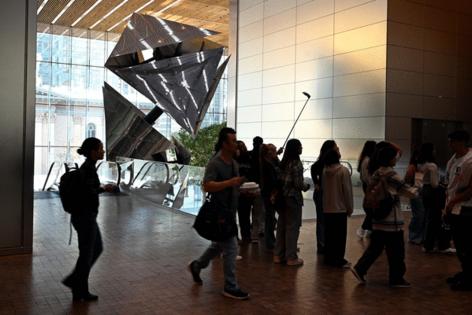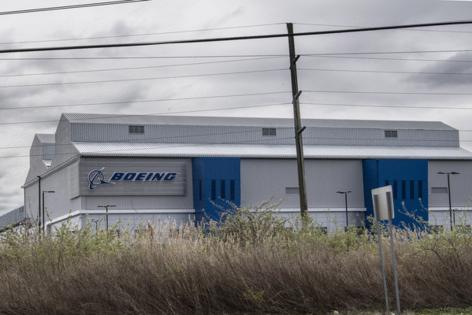In 2020, local corporations vowed to tackle 'systemic racism in America.' Now they are navigating a Trump-led backlash to DEI
Published in News & Features
Cencora Inc., a Conshohocken-based wholesale drug distributor, scrubbed a diversity, equity, and inclusion page from its website. Its chief DEI officer no longer works there, according to her LinkedIn profile.
Comcast made no mention of diversity in its latest annual report, departing from past practice, but that didn’t stop a federal regulator from opening an investigation last week to “root out invidious forms of DEI discrimination.”
And after a conservative nonprofit accused American Airlines of using discriminatory practices to increase its “representation of black professionals,” the company in December acknowledged that government contracting regulations “do not permit quotas, preferences, or set-asides.”
Publicly traded companies in the Philadelphia region and across the U.S. are trying to navigate a political backlash to diversity initiatives that was punctuated by President Donald Trump’s election victory. The president has so far followed through on campaign promises to dismantle federal DEI programs and push back against “wokeness” in society more broadly.
Soon after taking office, Trump signed executive orders to end DEI in the federal government, rescind affirmative-action requirements for federal contractors, and direct federal law enforcement and regulators to discourage “illegal discrimination” in the private sector. The president instructed agencies to identify the “most egregious and discriminatory DEI practitioners” for possible enforcement.
Trump’s Jan. 21 order said illegal DEI policies “not only violate the text and spirit of our longstanding federal civil-rights laws, they also undermine our national unity, as they deny, discredit, and undermine the traditional American values of hard work, excellence, and individual achievement in favor of an unlawful, corrosive, and pernicious identity-based spoils system.”
U.S. Attorney General Pam Bondi earlier this month directed her department to outline steps for “enforcing federal civil-rights laws and taking other appropriate measures to encourage the private sector to end illegal discrimination and preferences.” That could include proposals for criminal investigations, Bondi’s memo said.
‘Hysteria’
Corporate lawyers at the prominent New York firm Sullivan & Cromwell LLP “strongly” recommended “that private sector employers carefully monitor the changing landscape as we expect further developments in this area,” according to a memo published Feb. 10 by the Harvard Law School Forum on Corporate Governance.
Federal law has not changed for private-sector employers, and Trump’s order does not “provide any guidance on what makes a DEI program illegal,” according to an analysis by labor and employment lawyers at the firm Cozen O’Connor.
Proponents of diversity initiatives in the workforce are pushing back against the “hysteria,” as DEI consultant and employment lawyer Natalie Norfus put it.
The meaning of DEI “has been completely mangled,” she said. Employers use DEI initiatives to attract the best talent, including people who have different experiences and viewpoints; retain that talent by treating employees fairly; and help employees feel valued, Norfus said.
The notion that a company might have criminal liability because of its DEI policy is “silly,” she said in an interview.
“That, to me, also becomes like a dog whistle to get people scared,” said Norfus, founder of a Miami-based consulting firm. “Yes, it’s a headache to get investigated, but when you’re looking at the legal basis of it, as of today, there aren’t really laws on the books that, at least on the federal level, would prevent a company from having a DEI program.”
Some of Trump’s DEI-related executive orders are already being challenged in court by the City of Baltimore and other plaintiffs, she noted.
Big companies scale back DEI policies
Yet some big companies — including Google, Target, Walmart, and Meta — aren’t waiting to see how such litigation might unfold before scaling back or ending their DEI policies.
Boeing Co., which produces military helicopters at a plant in Ridley Park, recently dismantled its DEI department, Bloomberg reported in November. Still, the company told Bloomberg that it “remains committed to recruiting and retaining top talent and creating an inclusive work environment.”
Some corporations, such as Costco, have said they’re standing by their programs. Costco shareholders in January overwhelmingly rejected a proposal to evaluate risks associated with its DEI policies, and the wholesale retailer’s board said its “commitment to an enterprise rooted in respect and inclusion is appropriate and necessary,” the Associated Press reported.
Locally, even companies that continued to celebrate DEI on their websites as of Feb. 17, such as food and facilities provider Aramark and drugmaker Merck & Co., were tight-lipped about the matter. Neither firm responded to requests for comment about their DEI policies.
Trump’s anti-DEI agenda is rippling out across other local institutions, too. K-12 schools are reviewing a Trump order that aims to eliminate funding “for illegal and discriminatory treatment and indoctrination” in the classroom. The University of Pennsylvania’s medical school plans to dissolve committees involved in DEI efforts, The Inquirer reported.
It all amounts to whiplash after corporations and other institutions made sweeping pronouncements about their commitment to racial equity in the aftermath of George Floyd’s murder at the hands of Minneapolis police in 2020.
President Joe Biden promoted those principles in his administration, signing executive orders “advancing racial equity and support for underserved communities.” He also sought to embed equity in everything from budgeting and procurement to policy implementation, such as by directing climate investments to polluted communities.
Backlash reaches Comcast
But the backlash didn’t come overnight. Over the last few years, some GOP-led states enacted laws aimed at restricting DEI in the workplace, though courts found at least one such statute, in Florida, was unconstitutional.
The U.S. Supreme Court’s 2023 decision prohibiting colleges from using race-conscious admissions energized conservative activists who have since filed lawsuits challenging corporate diversity programs.
In 2022, the Wisconsin Institute for Law & Liberty sued Comcast over a grant program the company had pitched two years earlier as a way to boost Black-owned small businesses. The suit, filed on behalf of four small-business owners, alleged the program violated an 1866 federal law that the institute said “prohibits racial discrimination in the making and enforcement of private contracts.”
The parties ultimately reached a confidential settlement, the institute said, and Comcast later expanded the program to applicants from all backgrounds.
Comcast has continued to promote DEI, calling it “a core value of our business” on its website, which includes a breakdown of its workforce’s demographics by race and gender.
But there have been subtle shifts. Comcast did not mention diversity in the annual report it filed with the Securities and Exchange Commission last month — a change from the prior two years. Instead, the company wrote: “We promote a culture that embraces equal opportunity for all.”
Undeterred, the Federal Communications Commission last week said it had opened a probe into Comcast and its subsidiary NBCUniversal over their DEI practices. A Comcast spokesperson said the company “will be cooperating with the FCC to answer their questions.”
“For decades, our company has been built on a foundation of integrity and respect for all of our employees and customers,” Comcast said.
Scrubbed website
Other companies are seemingly racing to head off potential scrutiny.
Cencora, the drug distributor formerly known as AmerisourceBergen, since 2021 has highlighted in annual reports a “long-term DE&I strategy” focused on “four critical dimensions — people, culture, progress, and community.”
The company, which counts 46,000 “team members,” has tracked the demographic makeup of its workforce, board of directors, and executive management committee. It has touted its “score of 100” in the Human Rights Campaign’s Corporate Equality Index, which grades corporate policies pertinent to LGBTQ employees. And it has promoted its partnerships with diverse suppliers.
Cencora — which last year had $6.1 billion in binding agreements with the federal government — included similar information in its most recent annual report in September.
And as recently as last month, the company’s website featured a statement from its senior vice president and chief diversity, equity, and inclusion officer, Ann Anaya: “Our DEI journey will guide our path forward by uniting our global culture of inclusion, serving as a catalyst for health equity with our partners, and amplifying diverse perspectives to advance innovation and growth.”
That page has since been taken down. Anaya — hired in 2022 when, Cencora said, “investing in our people and fostering a culture that is purpose-driven and inclusive is an integral part” of the company’s strategy — stopped working there in November, according to her LinkedIn profile.
Cencora declined to say whether it had changed its DEI strategy. “Cencora has and will continue to make decisions that we believe will best support our business and meet the needs of our organization’s numerous stakeholders including our team members, customers, partners, investors and the communities in which we operate,” the company said in a statement.
“We believe that fostering an engaged and inclusive workforce drives our performance and best enables us to support global access to medications,” the statement said, adding that the company works diligently to comply with laws and regulations.
Lawsuits from activists
American Airlines, in a since-deleted July 2020 news release, advocated for using “our voices within the business community to encourage and support corporate efforts to eliminate systemic racism in America.”
The airline, one of Philadelphia’s biggest for-profit employers, pledged to increase “representation of Black professionals in our senior leadership” and “assist Black youth in developing job skills and expanding access to well-paying careers.”
Last year, America First Legal, a nonprofit founded by Trump aide Stephen Miller, asked the U.S. Labor Department to investigate the airline for allegedly violating federal contracting requirements that prohibit discrimination in hiring. American Airlines had received more than $140 million in federal contracts since 2008, the complaint said.
Citing the airline’s 2020 news release, America First Legal wrote in its complaint that the company “implemented overtly discriminatory hiring practices based on the race or color of the individuals involved.”
In December, the Labor Department held an “informal compliance conference” with the airline and wrote in a letter to America First that if the company fails to meet a hiring benchmark, it will “assess its employment practices” and “remedy any unlawful discrimination,” according to a copy of the letter the nonprofit posted on its website.
Such remedies could include broadening recruitment to “increase the diversity of applicant pools” and establishing programs to increase promotion opportunities for “underrepresented groups,” said the letter, which did not specifically use the terms “diversity, equity, and inclusion” or “DEI.”
DEI departments often already use those practices.
America First declared victory, saying the airline “acknowledged that recruiting and hiring based on Diversity, Equity, and Inclusion (DEI) violates federal laws and equal employment opportunities.”
“American companies must return to using merit — not the desire to check a DEI box — to select the most skilled and qualified employees,” America First Legal counsel Will Scolinos said in a statement.
The airline didn’t respond to a request for comment. Its website says the company is “proud to be a place where people of diverse generations, races, ethnicities, genders, sexual orientations, abilities, religions and other backgrounds are genuinely included and valued.”
_____
©2025 The Philadelphia Inquirer. Visit inquirer.com. Distributed by Tribune Content Agency, LLC.










Comments